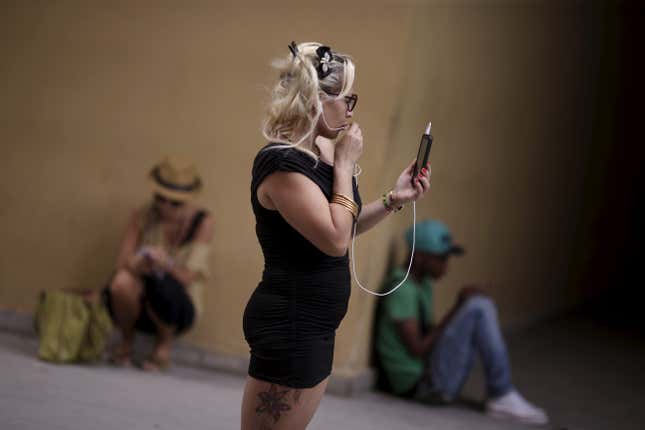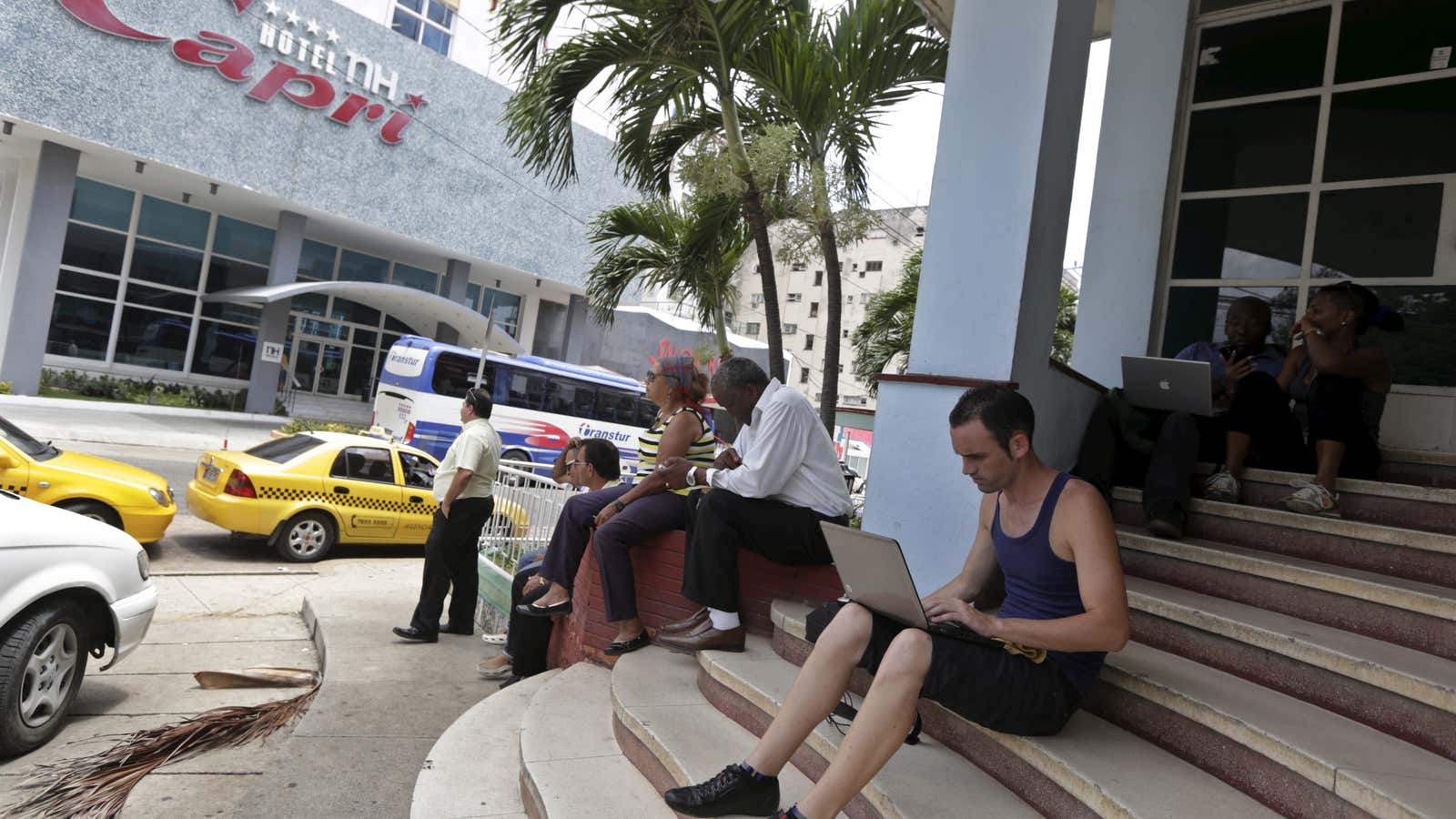Havana, Cuba
Cuba remains one of the world’s least connected countries, but that’s slowly changing. In July last year, Etecsa, the state-owned telecoms company, launched the country’s first wifi hotspots. A year on, and over 100 hotspots have been rolled out across the island.
Cubans are now accessing Gmail, Facebook and Twitter to connect with friends and family for the first time. While data on the number of smartphone owners is limited, according to Etecsa, around 150,000 of the island’s 11 million people now connect to the web daily.
But internet access remains expensive, with plenty of barriers. The average monthly salary in Cuba is $25, yet a one-hour wifi card costs $2 and an internet-enabled phone costs over $200 in state stores. And while Cubans can see social media pages and major news websites, government censors block dissident blogs.
It’s not only Cuba’s policies that thwart accessibility. Despite the thaw in relations, the US embargo on Cuba remains in place, prohibiting US-based firms from doing business there. Apple’s and Google’s app stores don’t allow downloads, blocking access to common apps like Skype and WhatsApp. (Facebook and others can be used via their websites.) The US, Cuba’s staunchest critic of the state’s grip on information, is effectively putting brakes on the liberatory power of the web.
But Cubans are used to finding solutions to seemingly impossible problems, and many are applying the same ingenuity that life in Cuba demands to life online.
Sacrifice, then connect
On a recent Saturday, Estrella Rodríguez, a retired Havana doctor, stood in the shade near a wifi hotspot. She was using IMO, a Skype-like video-calling app, to reach her daughter, who emigrated to New Zealand five years ago. Even if Cubans can find a way of installing Skype without going through the app store, it won’t let them connect from Cuba. IMO, however, does.
“It’s the first time I’ve seen my daughter since she left. I’m over the moon!” Rodríguez said, tearful and jumping with excitement in front of the pixelated stream of her daughter. “Until now we kept in touch by email, but this is the first time I’ve actually seen her.” Rodríguez said the family decided to forgo milk for a few weeks to save up the money for the wifi.
Nearby, teenager Miladis Llanes was also online. “The Internet is mostly for middle-class people. Poor people can’t connect,” Llanes said, in between checking Facebook. “Most people who connect here have family who top up their accounts abroad.”
But necessity breeds ingenuity. Close by, two kids lean against a building and whisper “Psssst – Connectify” to passersby. Connectify allows them to divide up and share the limited bandwidth that Etecsa wifi provides by creating personal wifi hotspots from their laptops. Users buy one-hour cards at $2, create three new password-protected wifi connections, and sell these connections on for a dollar each, pocketing a dollar profit in the process. The kids had no shortage of clients willing to connect at a lower speed for half the price.

Another innovation is the classified ads site Revolico. In a country where state supermarkets sometimes go weeks without toilet paper, and the state sells electronic goods at a beefy 240% markup, Revolico has become a household name. To keep up with demand, droves of Cubans are taking cheap flights to Panama to stock up on smartphones, laptops and clothes, before bringing them back to Cuba to post online. Though working as a mule is illegal and Revolico is blocked, people easily access the site through mirror websites. The state, unable to satiate the yearning for consumer goods, has so far turned a blind eye.
Limited connectivity has also led Cubans to develop apps that are fully functional offline. Alamesa, the island’s leading source of gastronomic information, is a case in point. The app, which is updated every fortnight, downloads descriptions, reviews, and photos of over 800 restaurants on to your phone. You can search them offline, and there are even maps to help you reach your eatery of choice. You can’t reserve via the app, but Alamesa’s creators have found a revenue stream: 30% of the restaurants pay, in cash, to get promoted.
Also popular is Zapya, an offline file-transfer app, which allows Cubans to skirt around the embargo to share popular apps such as Facebook and the offline version of Wikipedia. Any two people with Zapya installed on their phones can exchange files, apps, photos or videos at 2Mb per second, so long as they are within around 20 meters (66 feet) of each other.
Zapya also allows for group chat, making it Cuba’s answer to Tinder. Anyone in the vicinity can enter, and teenagers hanging out in parks, petrol stations, and even nightclubs browse the chats to see who’s around.
“You find all sorts on there. From weirdos to people you might have something in common with,” says Mayelin, who met her boyfriend through Zapya while at a concert.
Other low-tech apps have helped Cubans navigate the restrictions of daily life. Flashlight, which turns not just the phone’s camera flashlight but also its screen brightness up to the max, is handy in a country where power cuts are never far away. The app has become even more popular this summer as the government has introduced fuel rationing to manage power shortages on a scale not seen in decades.
3G Cuba
Chinese telecom firm Huawei is currently laying the fiber-optic cable for Cuba’s first broadband home internet services, which Etecsa plans to launch in Old Havana later this year. Prices are yet to be announced, but nobody expects them to be within reach of regular Cubans. The project is likely aimed more at the internet-hungry holidaymakers now flooding the historic quarter’s hostels and private homes.
Expensive as it is, though, the internet is making a difference to the lives of less well-off Cubans too. A record 43,000 people emigrated to the US (pdf) from the island last year. Traditionally, when a loved one left, the goodbye at the airport was often the last farewell. Now, Cubans abroad can pay for their family at home to have an internet connection and stay in touch—and that already has Cubans feeling much less isolated.
